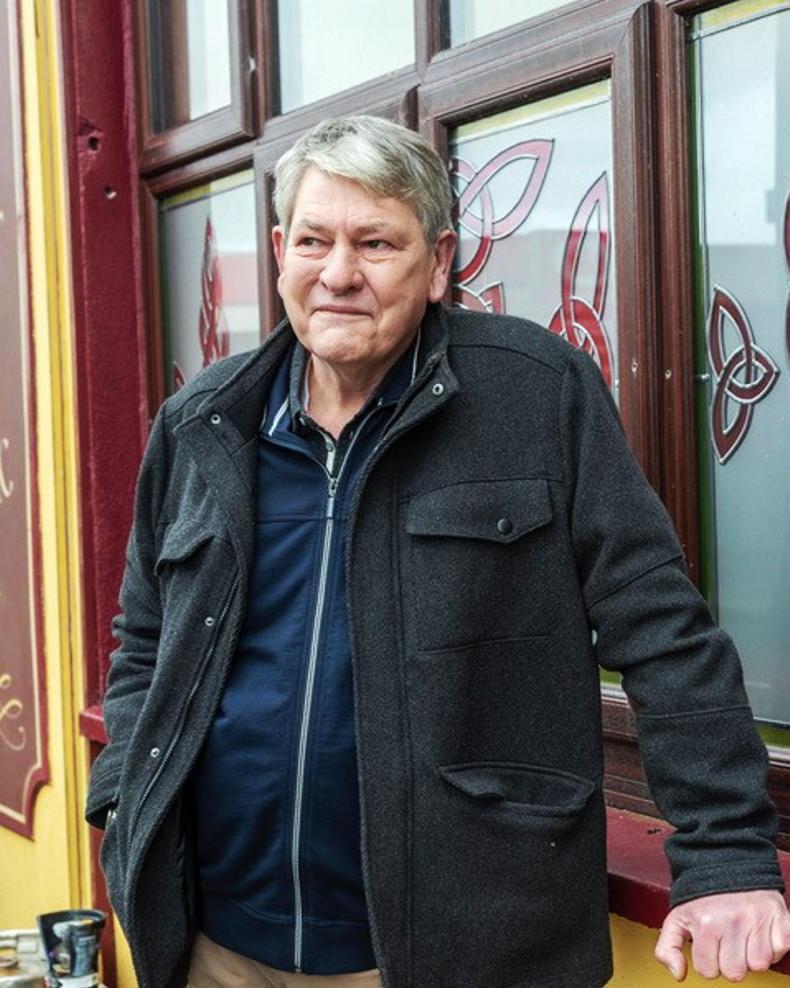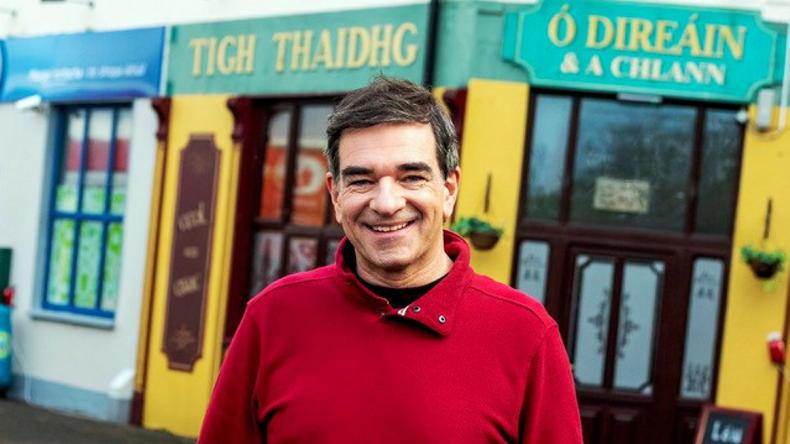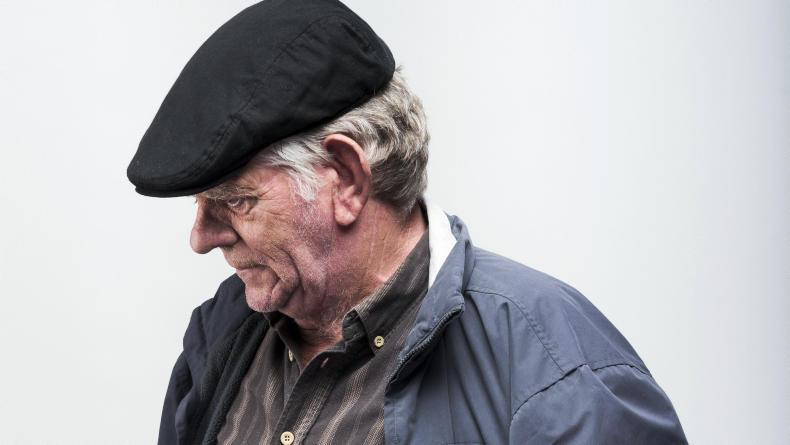A beautiful looking glass of wine is placed in front of me. It’s that deep purply, ruby colour. I swirl it around.
Unfortunately though, unless Our Lord appears to perform a miracle, I won’t be enjoying this glass of wine anytime soon. You see, this drink is actually an imposter. It’s blackcurrant posing as red wine.
I’m on the set of TG4’s Irish language soap, Ros na Rún, “acting” as an extra in the pub, Tigh Thaidhg. The crew here know all the tricks of the trade when it comes to making things appear real on screen.
The drinks are nearly always something else in disguise. In the local shop, Siopa XL, most of the non-perishables on shelves are real, but the rashers, for example, are actually just pictures of the bacon slices placed inside the packaging.
The set of the fictional Gaeltacht village is located just outside An Spidéal in Connemara. As an extra in a pub scene, most likely it’ll only be the back of my head that will appear on d’telly, but all the same, I feel nervous.
We do the scene a good few times, the various actors having to make changes this way and that to their performances. In the end, I decide this acting craic is harder than you’d think.
The cast and crew chat away to each other as Gaeilge. More than once, it takes me a few seconds to realise someone is speaking to me in Irish (not their fault, I’m the one on the set of an Irish language show without a word). All I can do is mouth back: “Béarla?”
The set is very impressive. On the outside it actually looks like a real village. There’s a petrol station, café, chemist and a taxi office. The list goes on.
There’s also an ATM, bus station and letterbox.
Over the years, there have been plenty of stories of tourists wandering on set and attempting to use the ATM, putting postcards in the letterbox and waiting for the bus (you’d be waiting).
Progressive
Now in its 27th season, Ros na Rún is Ireland’s only rural-based soap and the world’s only Irish language soap. Broadcasting on TG4 since 1996, last week the show’s 2,000 episode was filmed. It will air on 26 March 2023.
Over the years Ros na Rún has been known for its progressive storylines, tackling current social issues, such as homophobia, domestic violence and infertility, among others.
In 1996 Ros na Rún was responsible for the first gay kiss broadcast on Irish TV, just three years after homosexuality was decriminalised in Ireland.
Mairín Ní Eidhin is the head of scripting at Ros na Rún. She says the most important thing about scripting the show is making sure the stories have heart and are true to the characters they involve.
Old and new
Last season Pádraic Breathnach joined the cast of Ros na Rún. A writer and an actor, many people will know him for his role as Jacksie in Killinascully.
Pádraic is also renowned in the arts and culture community, both in Galway and across Ireland, for his involvement in founding the world famous Macnas Street Theatre Company, the Galway International Arts Festival and Cúirt Literary Festival with Galway Arts Centre.

Pádraig Breathnach who plays Sonny on Ros na Rún.
Being a rural soap, of course, dramas of the land are not exempt from Ros na Rún’s repertoire.
Pádraic arrived on set as Sonny, who returns from Boston to claim his farm inheritance at his homeplace. He runs into obstacles with his first cousin, Tadhg O Diréain (played by Ros na Rún stalwart Macdara Ó Fatharta), who’s been grazing this land all his life. A John B Keane-esq storyline.
Chatting with Pádraic on set, he’s in jovial form. His on-screen wife Crystal (played by Síle Uí Chiaráin) landed on set from the States this season. He jokes it’s much easier to acquire a family on TV and you don’t even have to feed them.
Pádraic is from Carna in Connemara and he is delighted with the chance to work in the west.
“Gaeilge is my first language. For years I’ve been turning east to Dublin to work. This is great, most mornings I turn west from Galway to go back to Connemara to work. It’s like going back home.
“It’s a pity this wasn’t here 50 years
ago. Opportunities like this weren’t
there for a lot of us who worked in the arts and creative sectors in Connemara. There was no work locally, so, we all bailed out. We went
anywhere we’d get work.
“I see now the young actors here are starting off at 16/17 and they’re getting great parts and doing very well. God, I wish that was there when I was around,” he laughs.
On acting in Irish versus English, Pádraic says it’s not so much the language that makes a difference, but the medium; the pace of soap acting is much faster than a drama series or film, for example. However, he feels most at home in Irish.
“Personally, I’m more comfortable in Irish than English. I’m more at home in Irish, so that really helps me. Irish doesn’t challenge me, but sometimes when I’m working in English, that does challenge me. There are some English words that I can’t get my mouth around at all.”
Macdara Ó Fatharta plays Tadhg, the man giving Sonny all the trouble. And while Pádraic like his character may be new on the scene, Macdara is the old hand, having been around since the beginning of Ros na Rún.
From Inis Meáin, the least populated of the Aran Islands, Macdara first made a name for himself acting in the Abbey Theatre in Dublin. In Ros na Rún, his publican character Tadhg, could be construed as a villain.
Macdara is much more reserved than his character and isn’t too fond of attention – particularly from the media – but still he chats away to me about his tenure on the show.
Over the years, Macdara says he’s very lucky to have gotten good storylines. One of his last big ones was when Tadhg’s half-sister came home from America and he fell for her.
“We had some very emotional scenes. It was tough, but it was rewarding. Then she dies and he has to bury her. Before that his estranged son came home and they don’t get on. He puts him in a coffin and tries to burn him alive, but he doesn’t succeed. That was filmed at three o’clock in the morning.
“I’ve had great storylines down through the years. That’s what keeps you going. Once the story is good and true to your character, it drives you on. You can’t have that all the time because there are a good few main characters and everyone has to get a decent storyline. It comes in waves.”
Having just had the pressure of having to drink a glass of wine in the background, I can’t imagine what it would be like to take on such feats as Tadgh, but after all, everyone’s got to start somewhere. Now there’s just the small matter of a cúpla focail. . .
Ros na Rún is a co-production between Danú Media and Tyrone Productions.Ros na Rún is the single largest independent production commissioned in the history of Irish broadcasting.The soap employs over 160 people including cast, crew and scriptwriters. The show broadcasts for 41 weeks of the year. It airs two episodes each week on Tuesday and Thursday evenings at 20:30 on TG4, with an ollchlár (or omnibus) on Sunday evenings from September to May. Ros na Rún works entirely as Gaeilge and offers employment and training opportunities to those working within the industry who have a fluency in the language. In 2008, legendary soap actor Mick Lally, best known for his role as Miley Byrne in Glenroe, joined the cast as self-made millionaire, Éamon de Faoite.On 3 March 2011, Stephen Fry featured in Ros na Rún in a cameo role. He played an English tourist who ends up in Tigh Thaidhg. His lines include, “Níl ocras orm” and “Slán go foil”.More recently Francis Brennan and Nathan Carter made cameo appearances. The title Ros na Rún plays on the double meaning of the Irish word “rún”, which has a basic meaning of “secret,” but also has a long history as a term of endearment, similar to “honey”, “sweetheart” or “darling”. Ros can mean either “a wood or wooded headland”. So the title can mean either “Wood/Headland of the Secrets” or “Wood/Headland of the Sweethearts”. Read more
Living Life: Returning to roots
Giving Gaeilge a voice
A beautiful looking glass of wine is placed in front of me. It’s that deep purply, ruby colour. I swirl it around.
Unfortunately though, unless Our Lord appears to perform a miracle, I won’t be enjoying this glass of wine anytime soon. You see, this drink is actually an imposter. It’s blackcurrant posing as red wine.
I’m on the set of TG4’s Irish language soap, Ros na Rún, “acting” as an extra in the pub, Tigh Thaidhg. The crew here know all the tricks of the trade when it comes to making things appear real on screen.
The drinks are nearly always something else in disguise. In the local shop, Siopa XL, most of the non-perishables on shelves are real, but the rashers, for example, are actually just pictures of the bacon slices placed inside the packaging.
The set of the fictional Gaeltacht village is located just outside An Spidéal in Connemara. As an extra in a pub scene, most likely it’ll only be the back of my head that will appear on d’telly, but all the same, I feel nervous.
We do the scene a good few times, the various actors having to make changes this way and that to their performances. In the end, I decide this acting craic is harder than you’d think.
The cast and crew chat away to each other as Gaeilge. More than once, it takes me a few seconds to realise someone is speaking to me in Irish (not their fault, I’m the one on the set of an Irish language show without a word). All I can do is mouth back: “Béarla?”
The set is very impressive. On the outside it actually looks like a real village. There’s a petrol station, café, chemist and a taxi office. The list goes on.
There’s also an ATM, bus station and letterbox.
Over the years, there have been plenty of stories of tourists wandering on set and attempting to use the ATM, putting postcards in the letterbox and waiting for the bus (you’d be waiting).
Progressive
Now in its 27th season, Ros na Rún is Ireland’s only rural-based soap and the world’s only Irish language soap. Broadcasting on TG4 since 1996, last week the show’s 2,000 episode was filmed. It will air on 26 March 2023.
Over the years Ros na Rún has been known for its progressive storylines, tackling current social issues, such as homophobia, domestic violence and infertility, among others.
In 1996 Ros na Rún was responsible for the first gay kiss broadcast on Irish TV, just three years after homosexuality was decriminalised in Ireland.
Mairín Ní Eidhin is the head of scripting at Ros na Rún. She says the most important thing about scripting the show is making sure the stories have heart and are true to the characters they involve.
Old and new
Last season Pádraic Breathnach joined the cast of Ros na Rún. A writer and an actor, many people will know him for his role as Jacksie in Killinascully.
Pádraic is also renowned in the arts and culture community, both in Galway and across Ireland, for his involvement in founding the world famous Macnas Street Theatre Company, the Galway International Arts Festival and Cúirt Literary Festival with Galway Arts Centre.

Pádraig Breathnach who plays Sonny on Ros na Rún.
Being a rural soap, of course, dramas of the land are not exempt from Ros na Rún’s repertoire.
Pádraic arrived on set as Sonny, who returns from Boston to claim his farm inheritance at his homeplace. He runs into obstacles with his first cousin, Tadhg O Diréain (played by Ros na Rún stalwart Macdara Ó Fatharta), who’s been grazing this land all his life. A John B Keane-esq storyline.
Chatting with Pádraic on set, he’s in jovial form. His on-screen wife Crystal (played by Síle Uí Chiaráin) landed on set from the States this season. He jokes it’s much easier to acquire a family on TV and you don’t even have to feed them.
Pádraic is from Carna in Connemara and he is delighted with the chance to work in the west.
“Gaeilge is my first language. For years I’ve been turning east to Dublin to work. This is great, most mornings I turn west from Galway to go back to Connemara to work. It’s like going back home.
“It’s a pity this wasn’t here 50 years
ago. Opportunities like this weren’t
there for a lot of us who worked in the arts and creative sectors in Connemara. There was no work locally, so, we all bailed out. We went
anywhere we’d get work.
“I see now the young actors here are starting off at 16/17 and they’re getting great parts and doing very well. God, I wish that was there when I was around,” he laughs.
On acting in Irish versus English, Pádraic says it’s not so much the language that makes a difference, but the medium; the pace of soap acting is much faster than a drama series or film, for example. However, he feels most at home in Irish.
“Personally, I’m more comfortable in Irish than English. I’m more at home in Irish, so that really helps me. Irish doesn’t challenge me, but sometimes when I’m working in English, that does challenge me. There are some English words that I can’t get my mouth around at all.”
Macdara Ó Fatharta plays Tadhg, the man giving Sonny all the trouble. And while Pádraic like his character may be new on the scene, Macdara is the old hand, having been around since the beginning of Ros na Rún.
From Inis Meáin, the least populated of the Aran Islands, Macdara first made a name for himself acting in the Abbey Theatre in Dublin. In Ros na Rún, his publican character Tadhg, could be construed as a villain.
Macdara is much more reserved than his character and isn’t too fond of attention – particularly from the media – but still he chats away to me about his tenure on the show.
Over the years, Macdara says he’s very lucky to have gotten good storylines. One of his last big ones was when Tadhg’s half-sister came home from America and he fell for her.
“We had some very emotional scenes. It was tough, but it was rewarding. Then she dies and he has to bury her. Before that his estranged son came home and they don’t get on. He puts him in a coffin and tries to burn him alive, but he doesn’t succeed. That was filmed at three o’clock in the morning.
“I’ve had great storylines down through the years. That’s what keeps you going. Once the story is good and true to your character, it drives you on. You can’t have that all the time because there are a good few main characters and everyone has to get a decent storyline. It comes in waves.”
Having just had the pressure of having to drink a glass of wine in the background, I can’t imagine what it would be like to take on such feats as Tadgh, but after all, everyone’s got to start somewhere. Now there’s just the small matter of a cúpla focail. . .
Ros na Rún is a co-production between Danú Media and Tyrone Productions.Ros na Rún is the single largest independent production commissioned in the history of Irish broadcasting.The soap employs over 160 people including cast, crew and scriptwriters. The show broadcasts for 41 weeks of the year. It airs two episodes each week on Tuesday and Thursday evenings at 20:30 on TG4, with an ollchlár (or omnibus) on Sunday evenings from September to May. Ros na Rún works entirely as Gaeilge and offers employment and training opportunities to those working within the industry who have a fluency in the language. In 2008, legendary soap actor Mick Lally, best known for his role as Miley Byrne in Glenroe, joined the cast as self-made millionaire, Éamon de Faoite.On 3 March 2011, Stephen Fry featured in Ros na Rún in a cameo role. He played an English tourist who ends up in Tigh Thaidhg. His lines include, “Níl ocras orm” and “Slán go foil”.More recently Francis Brennan and Nathan Carter made cameo appearances. The title Ros na Rún plays on the double meaning of the Irish word “rún”, which has a basic meaning of “secret,” but also has a long history as a term of endearment, similar to “honey”, “sweetheart” or “darling”. Ros can mean either “a wood or wooded headland”. So the title can mean either “Wood/Headland of the Secrets” or “Wood/Headland of the Sweethearts”. Read more
Living Life: Returning to roots
Giving Gaeilge a voice










SHARING OPTIONS